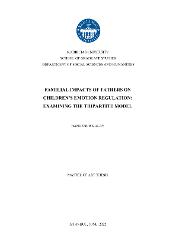| dc.contributor.advisor | Çarkoğlu, Aslı | en_US |
| dc.contributor.author | Kalay, Handenur | |
| dc.contributor.editor | ASLI ÇARKOĞLU | en_US |
| dc.date.accessioned | 2023-07-26T07:38:40Z | |
| dc.date.available | 2023-07-26T07:38:40Z | |
| dc.date.issued | 2022-06 | |
| dc.identifier.uri | https://hdl.handle.net/20.500.12469/4394 | |
| dc.description.abstract | Understanding the familial impacts and family emotional climate on children’s socioemotional development has received a lot of attention in the developmental psychology field. In this study, we aimed to examine paternal emotion-related parenting practices and family emotional climate on emotion regulation of 7–11-year-old children. A sample of 74 father-child pairs completed a survey that explored the relationships between paternal reactions towards their child’s sadness, paternal emotional expressivity towards other family members, interparental conflict, and child’s emotion regulation. The results demonstrated that paternal positive emotional expressivity predicted children’s emotion regulation both directly and indirectly via paternal reactions to their child’s sadness. Mixed findings were noted about the paternal reactions as mediators of paternal positive emotional expressivity and children’s emotional regulation. Paternal supportive reactions increased the positive association between paternal positive emotional expressivity and children’s adaptive emotion regulation. On the other hand, we could not find a statistically significant association for paternal unsupportive reactions on the relationship between paternal positive expressivity and children’s emotional adjustment. Higher levels of child’s perceptions of interparental conflict predicted higher emotional regulation in the child. However, we were unable to find a significant association between children’s exposure to interparental conflict and child’s emotion regulation. Additionally, paternal reactions towards their child’s sadness were insignificantly related with both paternal negative expressivity and interparental conflict. These findings highlight the need for further studies and better objective measurements of paternal emotional expressivity and interparental conflict. At the same time, this study provides further insights into fathers’ unique contributions to their child’s emotional development. | en_US |
| dc.language.iso | eng | en_US |
| dc.publisher | Kadir Has Üniversitesi | en_US |
| dc.rights | info:eu-repo/semantics/openAccess | en_US |
| dc.subject | Emotion Regulation | en_US |
| dc.subject | Emotional Socialization | en_US |
| dc.subject | Paternal Responsiveness | en_US |
| dc.subject | Paternal Reactions | en_US |
| dc.subject | Paternal Expressivity | en_US |
| dc.subject | Interparental Conflict | en_US |
| dc.subject | Family Emotional Climate | en_US |
| dc.subject | Fatherhood | en_US |
| dc.title | Familial impacts of fathers on children's emotion regulation: Examining the tripartite model | en_US |
| dc.type | masterThesis | en_US |
| dc.department | Enstitüler, Lisansüstü Eğitim Enstitüsü, Sosyal ve Beşeri Bilimler Ana Bilim Dalı | en_US |
| dc.relation.publicationcategory | Tez | en_US |
| dc.identifier.yoktezid | 747366 | en_US |
















